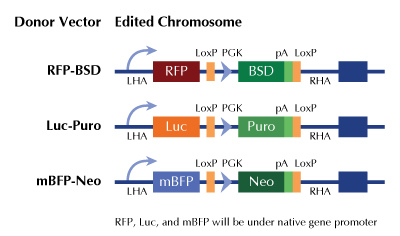E Cadherin (CDH1) Human Gene Knockout Kit (CRISPR)
CAT#: KN220731RB
CDH1 - human gene knockout kit via CRISPR, HDR mediated
Functional Cassette: GFP-puro Luciferase-Puro mBFP-Neo
HDR-mediated knockout kit validation
USD 1,657.00
4 Weeks*
USD 450.00
Specifications
| Product Data | |
| Format | 2 gRNA vectors, 1 RFP-BSD donor, 1 scramble control |
| Donor DNA | RFP-BSD |
| Symbol | E Cadherin |
| Locus ID | 999 |
| Components |
KN220731G1, E Cadherin gRNA vector 1 in pCas-Guide CRISPR vector KN220731G2, E Cadherin gRNA vector 2 in pCas-Guide CRISPR vector KN220731RBD, donor DNA containing left and right homologous arms and RFP-BSD functional cassette. GE100003, scramble sequence in pCas-Guide vector |
| Disclaimer | These products are manufactured and supplied by OriGene under license from ERS. The kit is designed based on the best knowledge of CRISPR technology. The system has been functionally validated for knocking-in the cassette downstream the native promoter. The efficiency of the knock-out varies due to the nature of the biology and the complexity of the experimental process. |
| Reference Data | |
| RefSeq | NM_001317184, NM_001317185, NM_001317186, NM_004360 |
| UniProt ID | P12830 |
| Synonyms | Arc-1; CD324; CDHE; ECAD; LCAM; UVO |
| Summary | This gene encodes a classical cadherin of the cadherin superfamily. Alternative splicing results in multiple transcript variants, at least one of which encodes a preproprotein that is proteolytically processed to generate the mature glycoprotein. This calcium-dependent cell-cell adhesion protein is comprised of five extracellular cadherin repeats, a transmembrane region and a highly conserved cytoplasmic tail. Mutations in this gene are correlated with gastric, breast, colorectal, thyroid and ovarian cancer. Loss of function of this gene is thought to contribute to cancer progression by increasing proliferation, invasion, and/or metastasis. The ectodomain of this protein mediates bacterial adhesion to mammalian cells and the cytoplasmic domain is required for internalization. This gene is present in a gene cluster with other members of the cadherin family on chromosome 16. [provided by RefSeq, Nov 2015] |
Documents
| Product Manuals |
| FAQs |
| SDS |
Resources
Other Versions
| SKU | Description | Size | Price |
|---|---|---|---|
| KN220731 | CDH1 - human gene knockout kit via CRISPR, HDR mediated |
USD 1,657.00 |
|
| KN220731BN | CDH1 - human gene knockout kit via CRISPR, HDR mediated |
USD 1,657.00 |
|
| KN220731LP | CDH1 - human gene knockout kit via CRISPR, HDR mediated |
USD 1,657.00 |
|
| KN420731 | CDH1 - KN2.0, Human gene knockout kit via CRISPR, non-homology mediated. |
USD 1,657.00 |
|
| GA100713 | CDH1 CRISPRa kit - CRISPR gene activation of human cadherin 1 |
USD 1,657.00 |
{0} Product Review(s)
Be the first one to submit a review






























































































































































































































































 Germany
Germany
 Japan
Japan
 United Kingdom
United Kingdom
 China
China
